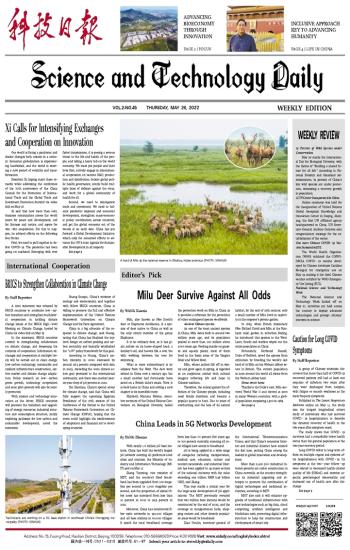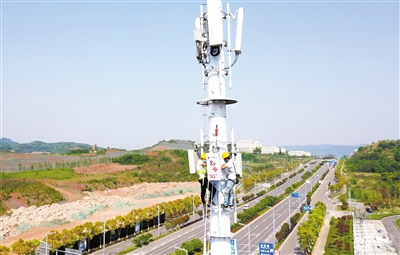
 Inclusive Approach Key To Advancing Humanity
Inclusive Approach Key To Advancing Humanity Advancing Bioeconomy Through Innovation
Advancing Bioeconomy Through Innovation Xi Calls for Intensifying Exchanges and Cooperation on Innovation
Xi Calls for Intensifying Exchanges and Cooperation on Innovation Milu Deer Survive Against All Odds
Milu Deer Survive Against All Odds WEEKLY REVIEW
WEEKLY REVIEW BRICS to Strengthen Collaboration in Climate Change
BRICS to Strengthen Collaboration in Climate Change Caution for Long COVID Symptoms
Caution for Long COVID Symptoms China Leads in 5G Networks Development
China Leads in 5G Networks Development PHOTO
PHOTO WECHAT ACCOUNT
WECHAT ACCOUNT E-PAPER
E-PAPER
 |
| Technicians are working on a 5G base station in southwest China's Chongqing municipality. (PHOTO: XINHUA) |
With nearly 1.6 million 5G base stations, China has built the world's largest 5G network covering all prefecture-level cities and counties, the Ministry of Industry and Information Technology (MIIT) said on May 17.
Zhang Yunming, vice minister of MIIT, said the country's fixed broadband has been upgraded from 100 megabits per second to 1,000 megabits per second, and the proportion of optical fiber users has increased from less than 10 percent in 2012 to 94.3 percent in 2021.
Moreover, China has constructed fiber-optic networks in 130,000 villages and 4G base stations in 60,000 villages. It raised the rural broadband coverage from less than 70 percent five years ago to 100 percent currently, ensuring all rural villages have access to broadband.
5G is being applied in a wide range of categories including transportation, medical care, education, culture and tourism nationwide, and industrial Internet has been applied to 45 major sectors of the national economy with the value exceeding one trillion RMB (149 billion USD), said Zhang.
This year marks a critical year for the large-scale development of 5G applications. The MIIT previously revealed that two million base stations would be constructed by the end of 2022, and the coverage in transportation hubs, shopping centers and other densely populated areas would be broadened.
Zhao Houlin, secretary-general of the International Telecommunication Union, said that China's consumer Internet and industrial Internet have entered the fast lane, putting China among the leaders in global innovation and development.
More than 2,400 5G+ industrial Internet projects are under construction in China currently, as the country strengthens its industrial upgrading and attempts to promote the combination of digital technologies and traditional industries, according to MIIT.
MIIT also said it will enhance upgrades of traditional infrastructure with new technologies such as big data, cloud computing, artificial intelligence and blockchain next, promoting digital infrastructure to help the construction and development of smart city.

 Next
Next



